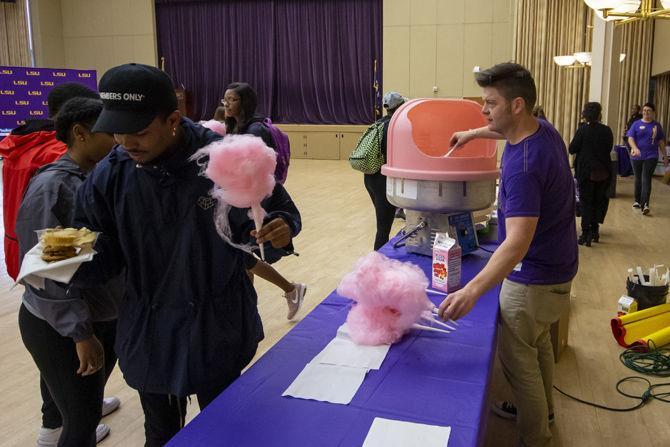National First Generation Student Day may have been on Nov. 8, but LSU First Year Experience wanted to keep celebrating the University’s first generation students all week.
The office partnered with several other campus offices including the Office of Diversity, McNair Scholars Program, Student Support Services, Transfer Student Services, Upward Bound and LSU Athletics to host a series of programs from Nov. 5 until Nov. 9.
The research fair, scheduled to kick off Monday’s events, was postponed until the end of the week due to inclement weather. Scheduled activities resumed on Tuesday with court recognition at the women’s basketball game, and carried over into Wednesday and Thursday with a town hall panel and a faculty lunch discussion. A carnival style “fun fair” on the Parade Ground on Friday combined with the resource fair capped off the week’s festivities.
Fifteen percent of LSU’s incoming freshman class self-identified as a first generation student, which is defined as neither parent having obtained a four year degree, according to the Director of the First Year Experience Dr. Missy Korduner.
“I had a couple of students come up to me and say ‘I don’t even know what a first generation student is, what is that?’ So I’d be willing to bet that there are other students out there that are first gen, but they don’t realize what that means,” Dr. Korduner said.
The concept of first generation students is not entirely new. The Higher Education Act of 1965 spurred the introduction of the term. However, it was only last year that the Council for Opportunity in Education’s Board and the Center for First-generation Student Success of NASPA-Student Affairs Administrators in Higher Education popularized Nov. 8 as National First Generation Student Day among many colleges campuses around the country. Although the University held a few smaller events last year, 2018 marks the first year of an officially organized celebration that Dr. Korduner wants to make annual.
“I’m hoping that we can expand it, and we can look at doing some additional things throughout the year,” Dr. Korduner said.
The University’s increasingly larger and more diverse freshman class contributes to the influx of first generation students. These students are sometimes disadvantaged coming to the University with little prior knowledge or firsthand experience regarding college life. The First Year Experience and the Center for Academic Success guides them through unfamiliar processes such as filling out financial aid forms and navigating the scheduling process.
“Students who have been around University life or had family who went here may take for granted that they know what the bursar is, they know about completing a FAFSA, but first generation students don’t always know,” Dr. Korduner said.
Dr. Korduner speaks from personal experience as a former first generation student. She led the faculty lunch discussion on Thursday to guide other faculty and staff members on how to best support first generation students in the classroom.
“The academic transition was a little shocking to me because I, like to a lot of students I talk to on a regular basis, did very well in high school,” Dr. Korduner said. “In college I had to study days in advanced and I couldn’t wait until the night before. That was an adjustment for me.”
McNair Scholar and Biology Senior Jamiri Brown is a current first generation student who attributes her academic success to the supportive programs and mentors she met along the way.
“As a first generation college student, I experienced and overcame obstacles on my own without an example to follow,” Brown said. “It is because of God, my family, the Ronald E. McNair Program and various figures in my life that allowed me to develop strong determination to continue my education.”
Brown conducts breast cancer research within McNair program, an elite research opportunity that highly engages first generation students. She plans on pursuing a master’s degree in genetic counseling as of Fall 2019.
While both Brown and Dr. Korduner described their first generation experience as an obstacle, it is one that University faculty is becoming increasingly aware of and taking steps to accommodate.
“You adapt. That’s something I tell every student I meet with. It’s okay if it takes you a little while to transition,” Dr. Korduner said. “I always tell them to give themselves a little grace. Utilize the resources that are available because that’s why we’re all here. We want to see all our students be successful. You’ll get there, and it’s okay if it’s not your 4.0 semester. You can still be successful and you can still make it.”








